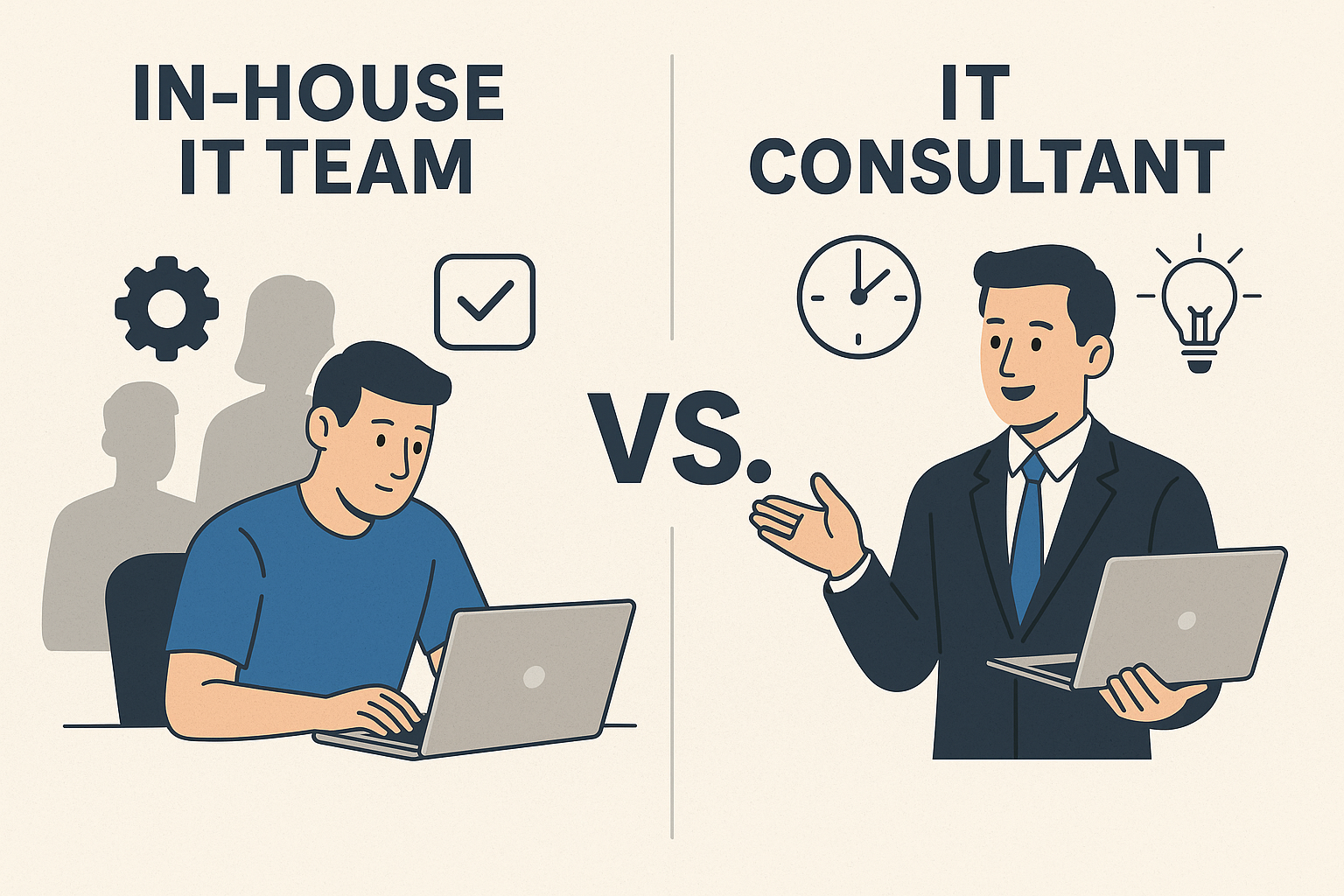In-House IT Team or Consultant: What’s Right for You?

Every business today depends on technology. Whether it’s managing cloud infrastructure, improving cybersecurity, or just keeping systems running smoothly, the question comes up sooner or later—should you hire an IT consultant or build your own tech team?
There’s no one-size-fits-all answer. What works for a fast-scaling startup may not suit an established enterprise. But understanding the differences can help you decide what makes sense for your business now—and in the long run.
When Bringing in a Consultant Makes Sense
1. You need fast, expert help.
Sometimes, a tech challenge pops up that’s too complex for your current setup. Maybe you’re planning a system upgrade, moving to the cloud, or tightening security. In these cases, bringing in someone who’s done it before—many times—can save you time and prevent costly missteps.
2. It’s a short-term project.
Hiring and onboarding full-time staff takes time. For time-bound projects or seasonal needs, a consultant gives you flexibility. You pay for what you need—no ongoing salary or overhead. This flexibility is especially useful when handling transitions, upgrades, or temporary spikes in workload.
3. You’re looking for an outside perspective.
When you’re deep in the day-to-day, it’s easy to miss inefficiencies. Consultants often spot gaps and offer solutions you might not have considered. They come in with fresh eyes, and that can be a real advantage when rethinking your IT strategy or evaluating new technologies.
4. Budget is tight, but quality matters.
Hiring full-time tech staff can be expensive. If your business needs high-level guidance without committing to a full department, IT consulting services offer a practical, budget-friendly alternative. You gain access to top-tier knowledge while maintaining financial control.
When It’s Better to Build an Internal Team
1. You rely on tech daily.
If your operations are deeply rooted in digital processes, having people who know your systems inside and out can make a big difference. An in-house team learns your workflow and can respond quickly when things go wrong, reducing downtime and increasing efficiency.
2. You want more control.
When your IT team is under the same roof, communication is easier, priorities are clearer, and accountability is stronger. This setup is ideal for businesses that need tight integration across departments and ongoing collaboration between teams.
3. You’re in it for the long haul.
If you’re building something that will grow and evolve over time—custom platforms, tools, or internal systems—having a team that grows with you can lead to better results. They develop company-specific knowledge and contribute to a stronger, more tailored tech foundation.
4. Company culture matters
Employees who understand your mission and values often make better long-term collaborators. Over time, your in-house IT team becomes part of your culture and shares in your vision for growth. Their commitment often translates into more consistent support and innovation.
Finding the Right Balance
In many cases, the best approach is a mix. You might start with a consultant to get the ball rolling—set up infrastructure, plan your tech roadmap, or tackle a complex migration. Then, as your needs grow, you can bring in permanent team members to maintain and evolve those systems. Some businesses even keep both options in play to stay flexible and scalable.
The Bottom Line
Both options have value. Consultants offer speed, specialization, and flexibility. In-house teams bring consistency, deep knowledge, and alignment. The right choice depends on your current challenges and future goals. Think of it less as one or the other—and more about what your business needs to move forward with confidence.
Note: IndiBlogHub features both user-submitted and editorial content. We do not verify third-party contributions. Read our Disclaimer and Privacy Policyfor details.







